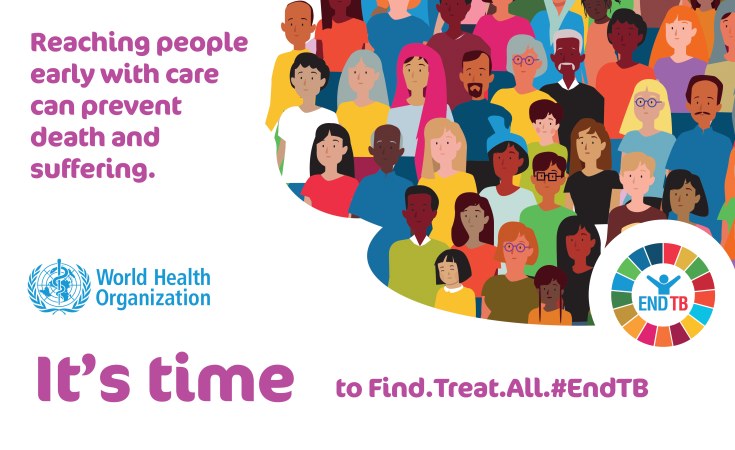The Stop TB Partnership has unveiled a costed plan for the world to end tuberculosis (TB), the second leading infectious disease killer in the world, after COVID-19.
The Global Plan to End TB 2023-2030 ('Global Plan') outlines the priority actions and estimated financial resources needed to end TB as a global health threat by 2030.
It also lays out how, from now up to 2030, a global investment of US$250 billion could save millions of lives through early diagnosis and treatment of 50 million people with TB; the development, approval and distribution of a new TB vaccine; and the redoubling of efforts so that emerging crises like the COVID-19 pandemic or conflicts, like the ongoing war in Ukraine, do not derail TB programs.
The total amount of funding needed to support the Global Plan's ambitions is the equivalent of every person in the world donating US$4 per year for the next seven years. The economic return on this investment would amount to US$40 for every US$1 invested--and as much as US$59 for every US$1 invested in low- and lower-middle-income countries. If instead, the status quo is maintained, TB is expected to continue to kill between 4,000-5,000 people every day, an additional 43 million people will develop TB and the cost in human life and disability would translate to a global economic loss of US$ 1 trillion.
"The COVID-19 pandemic delivered a crystal-clear wake-up call: that we cannot ignore a disease just because it has been relegated only to the poorest parts of the world," said Dr. Paula Fujiwara, who led the task force in charge of the development of the Global Plan. "With our attention diverted--along with the absence of financial commitments--TB has strengthened its grip on our planet. But we can regain control and meet our commitments to end TB by 2030 as long as we assert our political will now."
The Global Plan maps out how to end TB as a public health challenge by 2030--the year by which governments around the world committed to achieving the United Nations Sustainable Development Goals (SDGs). SDG three is to "ensure healthy lives and promote well-being for all and all ages," and one of the targets includes ending the TB epidemic. This goal was the focal point of the 2018 United Nations High-Level Meeting (UNHLM) on TB, where member states embraced several global commitments that the world currently is not on track to meet, especially because of the setback to the global TB response due to the COVID-19 pandemic.
"The global community's response to the COVID-19 pandemic was to plow money and resources into developing diagnosis tools, treatments and vaccines at lightning speed," said Dr. Lucica Ditiu, Executive Director of the Stop TB Partnership. "TB afflicts 10 million people every year, claiming one and a half million lives, and yet the global response has been tepid at best. A similar airborne infectious disease, TB remains neglected, even though it is a health threat for every single person. It is in the interest of all of us to end TB."
The Global Plan highlights the need to invest in a new TB vaccine, approve it by 2025, and make sure that resources are available so that it can reach adults and adolescents in countries where TB is most prevalent. The only TB vaccine currently available is the BCG vaccine, which was approved over a century ago and has a minimal impact on disease prevention.
"The proposed investment of US$ 10 billion in new TB vaccines, a new tool we all are waiting for, is 10 times less than what was injected in the research and development for COVID-19 vaccines. It should be possible to have the TB vaccine, isn't it?" said Dr. Ditiu.
Because future pandemics are also likely to be caused by airborne respiratory infections, the Global Plan positions TB prevention at the center of pandemic preparedness and response efforts.
"From COVID-19 to any number of crises--including needless wars, mass migrations, famines and other natural disasters--the global community has a long list of excuses for letting TB linger," added Dr. Ditiu. "Today, the Global Plan outlines how we can end the disease: invest in the science and make sure everyone can access the results, especially those from impoverished regions where TB is most entrenched."
Between 2023 and 2030, the Global Plan calls for the mobilization of US$249.98 billion, diversifying the sources of financing from domestic budgets of governments, external donors, development banks, social health insurance, philanthropy, the private sector, and new sources of funding. Of this, US$157.2 billion is for TB prevention and care, US$52.6 billion for vaccination once new vaccines are available, and an additional US$40.18 billion to accelerate the development of new TB medicines, treatment regimens and diagnostics.
The funding needs to be detailed in the Global Plan are essential to recapture lost progress due to COVID-19 and accelerate progress towards ending TB--previous reports from the Stop TB Partnership noted that COVID-19 had cost the world 12 years of progress against TB. As a result, the action steps in the Global Plan would speed up research and development, scale-up access to modern tools and make up for years of shortfalls in TB funding. Additional funding needs are also outlined for community-level services, efforts to protect the rights of people with TB and support for a stigma-free and gender-responsive approach to TB care and prevention.
To end TB, we will need an all-hands-on-deck approach from governments and a diverse range of partners from civil society and affected communities and an increasing investment through mechanisms like Challenge Facility for Civil Society to ensure we can play our role" said Choub Sok Chamreun, executive director of Khmer HIV/AIDS NGO Alliance and Co-Chair of Activists' Coalition on TB Asia- Pacific (ACT! AP). "We are treading water instead of making waves, and we are losing too many people as a result. It's time to end TB for good."


